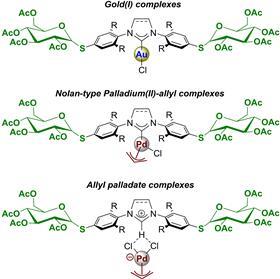Combine gold atoms, thioglucosides and N-heterocyclic carbenes and you get a complex that targets ovarian cancer cells in vitro while leaving healthy tissue untouched, writes a Flemish-Italian team in the European Journal of Inorganic Chemistry.

One of the problems with chemotherapy is that it not only kills cancer cells but also attacks healthy tissue and is therefore not specific. The development of cancer-specific drugs is therefore a high priority. In recent years, molecules containing gold, palladium, sugar molecules or N-heterocyclic carbenes (NHCs) have been tested as potential drug candidates. Researchers from Ghent University and the Università degli Studi di Padova combined all these components and found that their complexes worked well against ovarian cancer cell lines.
Having previously worked with metal-carbene complexes, the groups decided to try combining these with sugars. In particular, acetylated glucose seems to help the uptake of metal drugs in cancer cells due to their increased metabolism, as shown in a previous study. Their molecules therefore contain an NHC-gold or palladium complex with acetylated glucose attached to the NHC by a thiobond on either side.
After successfully synthesising three variants – with gold, palladium(II)-allyl and allyl palladate – they compared the activity, efficiency and specificity with cisplatinum and other thioglucoside-metal complexes. They exposed several cancer cell lines - including cisplatin-resistant cell lines - and a healthy cell line to the molecules.
Several of the Flemish-Italian variants showed high cytotoxicity in the cancer cell lines, while toxicity to the healthy cell line remained minimal. These variants are now being tested in vivo.
Bru, F. et al. (2024) EurJIC e202400822, DOI: 10.1002/ejic.202400822












Nog geen opmerkingen